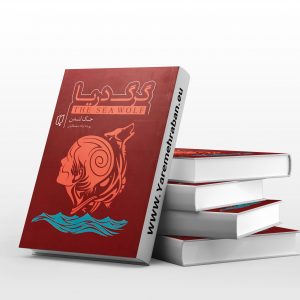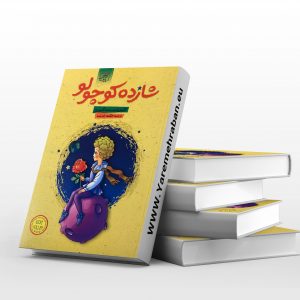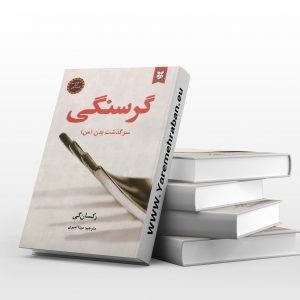Description
In the penal colony is written in German and was first translated into English in 1941 by Eugene Joulas. After that, the group of convicts was translated in many countries and attracted a lot of attention all over the world.
Book of the group of convicts
“As soon as we are born, we are judged, and our whole life is like a string of nightmares that pass through the teeth of the wheel of justice. “Finally, we will be severely punished, and in the middle of a suffocating day, the person who arrested us in the name of the law will plunge a gall into our hearts and we will kill dogs.” These are the words of “Sadegh Hedayat” in Kafka’s message; Introduction written by Hedayat for Kafka’s group of convicts. The Convicts is a short story by Franz Kafka that depicts the fate of man symbolically.
About the group of convicts
Franz Kafka wrote the short story of the convicts in Germany in 1914, rewrote it four years later, and finally published it in 1919. The group of convicts is one of the few works of Kafka that has been published during his lifetime.
Franz Kafka, in the group of convicts, has created a society with simple language but terrifying descriptions and has symbolically tried to portray his views on man, life and death, and his powers. Franz Kafka has been able to create a memorable image, and there are few people who do not think about reading this book and can forget its details.

Synopsis In the penal colony
The group of convicts passes on an unnamed island, which is called throughout the story of the land of the convicts. A completely military atmosphere rules the island and all the rules are absolute orders. The story begins with a scene in which a convict is taken to the execution machine. The execution machine was invented by the former island commander. Execution takes place in a painful and unbelievable way, and Kafka describes all the scenes in terrifying detail in an interpersonal conversation that has been reported with the landlord with the officer in charge of the execution.
Criticism of the group of convicts; A painful fate for man
The Convicts Group is a work to which audiences, singers, and critics have reacted differently. Because the story is written symbolically, lengthy interpretations have been written on it, and many people have tried to understand Kafka’s ideas correctly and completely.
Shahriar Zarshenas, a journalist and researcher of critical literature, has written on this book and studied its various angles. The critique, published by the Comprehensive Humanities Portal, discusses in general why Kafka’s works are widely used, and uses the group of convicts as an example of a critique of Kafka’s ideas. “The story of Kafka’s convicts is really nothing of literary value,” the critique reads.
It did not give a proper subject, nor a specific subject, nor a strong narrative payment. In a sense, it is an expression of sadism that is rippling through Kafka’s existence … “In another part of this critique, Zarshanas points to another aspect of the story:” Some of these stories have concluded that Kafka made an anti-colonial statement. But it is quite the opposite. “I think Kafka defeated colonialism and the presence of the old dictatorships of those societies, but he endorsed the new colonialism.”
Influence of the convict group; From music to video games and works by other authors
The group of convicts may be a short story, but it has been very effective. American musician Frank Zappa has recommended reading this short story before listening to “megaphone of destiny plated chrome” in his “We Are Here Only for Money” album notes. Ian Curtis was also inspired by the short story “Clooney”. The Canadian band Woman also has a song called The Convicts, which refers to Kafka’s book.
Genet Wolf’s novel “Shadow of a Torturer” is also inspired by the execution machine in Kafka’s story. Even the famous “Resident Evil” video game, also known in Iran as the “Residence” of the devil, is influenced by Kafka’s story, and an island called the “Island of Punishment” is designed.
We can see traces of the story of the convicts even in the novel “Kafka on the Shore” by Haraki Murakami.
About Kafka; Absurdity in different aspects of life
Kafka, a German-Jewish writer, was born in 1883 in Prague, the present-day capital of the Czech Republic. At that time different people from different lands lived in Prague and this city was a kind of meeting place of different cultures and civilizations. People like Sadegh Hedayat have considered this environment as a factor in cultivating a personality like Kafka. Another noteworthy point in Kafka’s life is his father. A father whom Kafka has feared all his life and lived in the shadow of. Kafka turned to law after graduating from university. His goal in further education was to gain independence and personal life and to get rid of living with his father. He received his doctorate in law from the University of Prague and worked in the insurance industry for some time.
Kafka’s emotional life was not very successful and he did not experience good relationships. The number of his friends was also very limited, and of course, out of these limited people, “Max Brod” later became his guardian, and Kafka entrusted all his works to him. Franz Kafka had no interest in publishing his works and burned many of them himself before his death. He also asked Brod to burn the works in his possession. Max Brod did not comply with this will, and many of Kafka’s works were published after his death.
Franz Kafka contracted tuberculosis at the age of forty and died in 1924 at a tuberculosis sanatorium.
Kafka’s works; About humans
Kafka has three feature-length novels, Palace, Trial, and America. Kafka did not finish any of these books. Another very famous work of Kafka, which has been translated and published several times in Iran, is the book Metamorphosis, which has many fans and has reached numerous editions.
Kafka’s message; Sadegh Hedayat Literary Will
Kafka’s Message is a short essay by Sadegh Hedayat, a great contemporary novelist and creator of works such as The Blind Owl and The Stray Dog. Kafka’s message is considered to be Sadegh Hedayat’s literary testament. Guidance after Kafka’s message has no other effect on the record.
In this article, Sadegh Hedayat, who shared ideas with Kafka, discusses Kafka’s personality, thoughts, and analysis of his works. Nihilism is a theme that is prominent in Kafka’s and Hedayat’s works. Although the two authors grew up in different cultural contexts and with different concerns, the themes of their ideas are very close.
In the penal colony in Persian
The first translation of the group of convicts in 1327 was published in Iran. This book was written in two parts. The first part was dedicated to the writing of Kafka Sadegh Hedayat’s message and the next part was Hassan Ghaemian’s translation of the short story of the convicts. This translation has been reprinted by various publications such as Amirkabir and Negah during different years.
In a part of the book, we read about a group of convicts
The obscenity was monolingual, but the officer restrained himself; “I did not know, it is not my fault,” he said. Moreover, I am more competent than anyone else to explain the methods of our judiciary; “Because I’m here …” He put his hand on his chest behind the inside pocket of his torso. “I have all the former commander’s handwritten drawings here.”
The traveler asked, “Commander’s own handwritten drawings?” So he had all the art in him? “Was he a soldier, a judge, an engineer, a chemist, a designer?”
The officer shook his head and said with a stare and admiration, “Yes, absolutely!” Then he threw down his hands; He did not think they were clean enough to hit the maps, went to the sink and washed his hands again, then pulled a leather bag out of his pocket and said, “Our sentence is not violent; Darkhish writes the same command on his body that the convict did not obey; “For example, on the body of this convict – he showed the convicted officer – Darkhish will write, Respect your superiors!”
The tourist glared at the convict. The officer lowered his head when the officer pointed a finger at the convict. He seemed to use all his strength unless he could guess what he was hearing; But the movements of his swollen lips, which pressed against each other, clearly showed that he could not understand the officer’s words. The tourist had many questions; But as he looked at the convict, he simply asked, “Does this man know his punishment?”
The officer said “no” and wanted to get his explanation; But the traveler ran in his words: “Does he not even know about the punishment that has been imposed on him?”
“No,” the officer said again, pausing for a moment. It was as if he was waiting.
1- Introducing the book In the penal colony on YouTube
2- Introducing the book In the penal colony in Aparat














Reviews
There are no reviews yet.